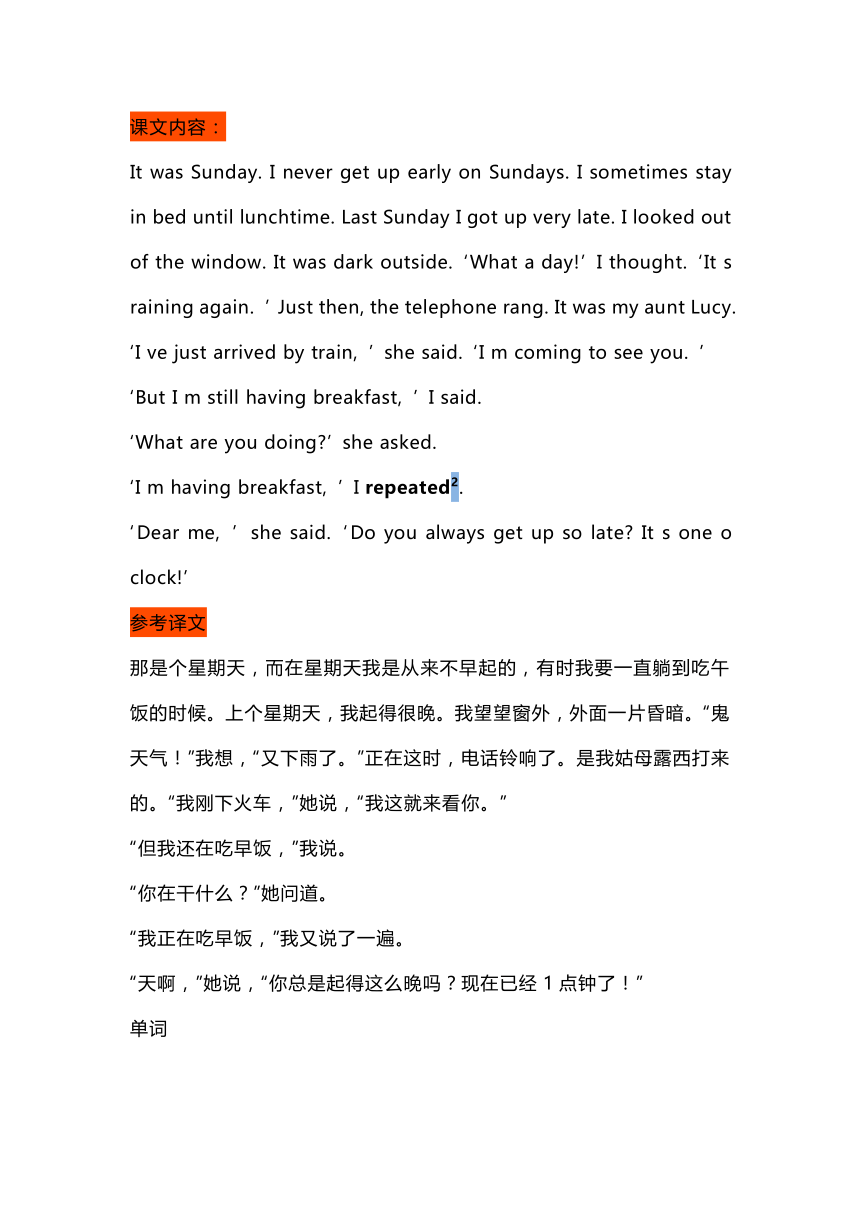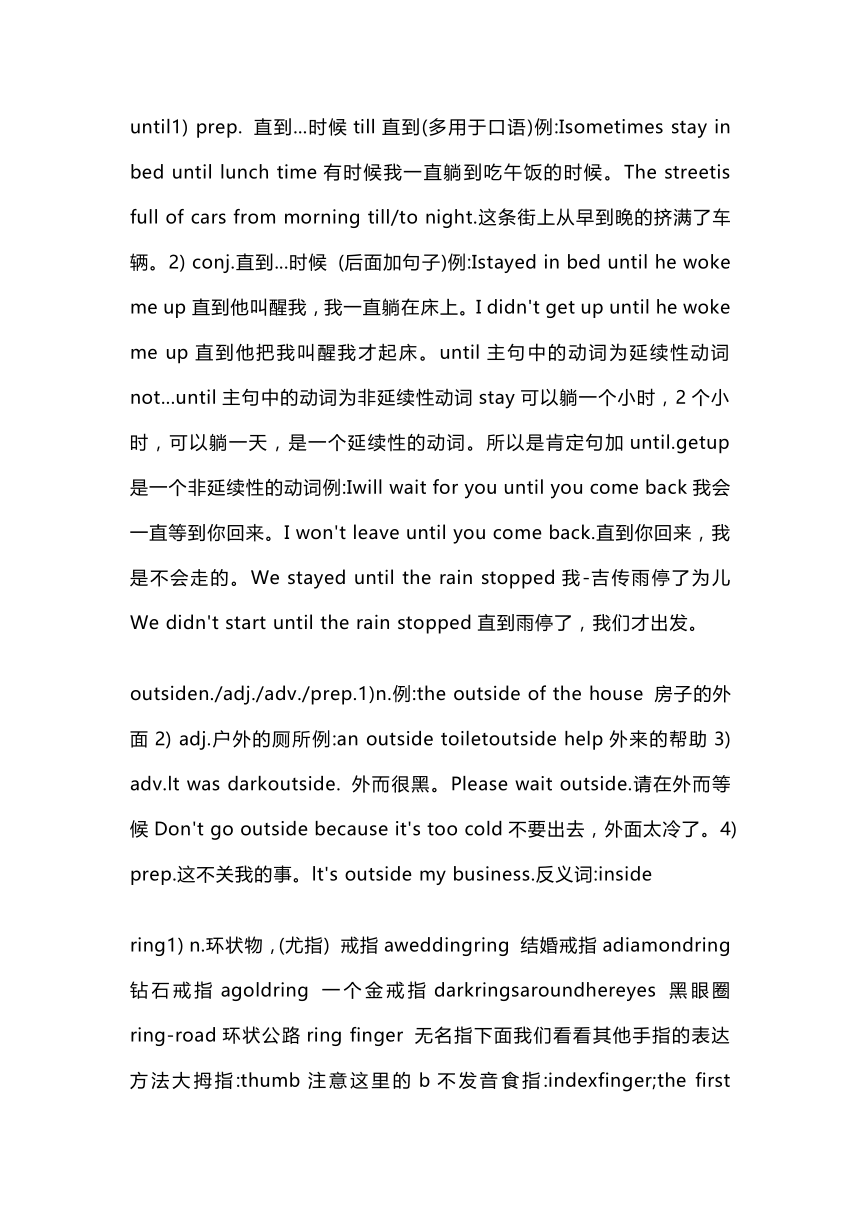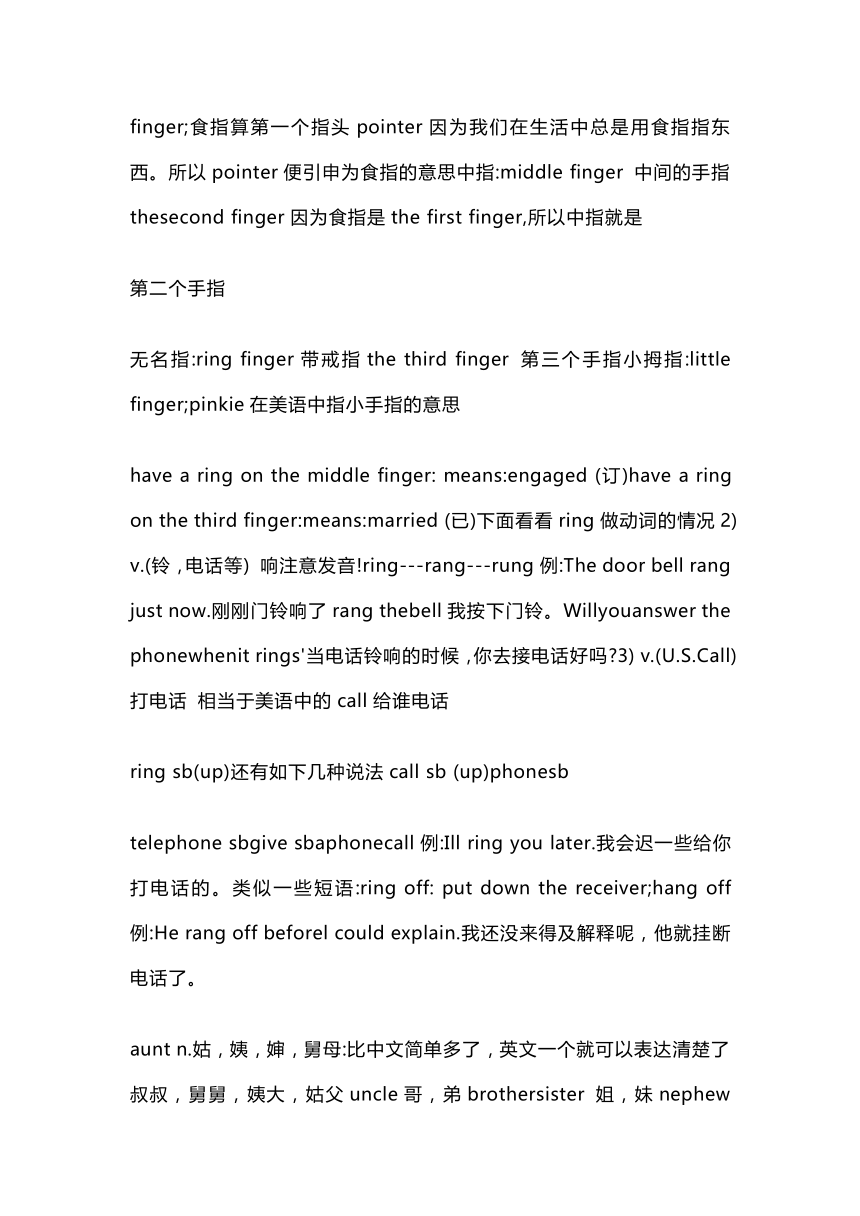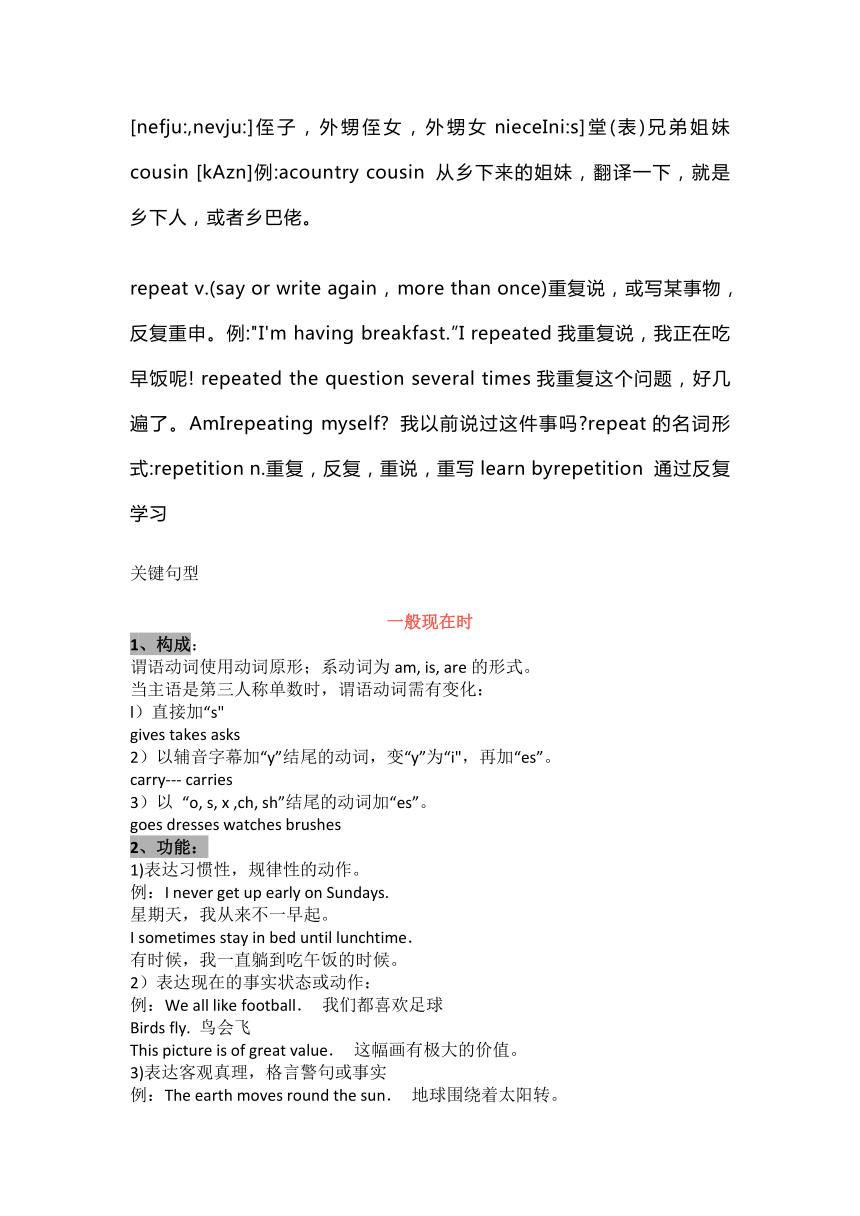新概念英语第二册 Lesson 2 Breakfast of Lunch 讲义
文档属性
| 名称 | 新概念英语第二册 Lesson 2 Breakfast of Lunch 讲义 |  | |
| 格式 | docx | ||
| 文件大小 | 24.9KB | ||
| 资源类型 | 教案 | ||
| 版本资源 | 新概念英语 | ||
| 科目 | 英语 | ||
| 更新时间 | 2023-09-26 16:55:00 | ||
图片预览




文档简介
课文内容:
It was Sunday. I never get up early on Sundays. I sometimes stay in bed until lunchtime. Last Sunday I got up very late. I looked out of the window. It was dark outside. ‘What a day!’ I thought. ‘It s raining again. ’ Just then, the telephone rang. It was my aunt Lucy. ‘I ve just arrived by train, ’ she said. ‘I m coming to see you. ’
‘But I m still having breakfast, ’ I said.
‘What are you doing ’ she asked.
‘I m having breakfast, ’ I repeated2.
‘Dear me, ’ she said. ‘Do you always get up so late It s one o clock!’
参考译文
那是个星期天,而在星期天我是从来不早起的,有时我要一直躺到吃午饭的时候。上个星期天,我起得很晚。我望望窗外,外面一片昏暗。“鬼天气!”我想,“又下雨了。”正在这时,电话铃响了。是我姑母露西打来的。“我刚下火车,”她说,“我这就来看你。”
“但我还在吃早饭,”我说。
“你在干什么?”她问道。
“我正在吃早饭,”我又说了一遍。
“天啊,”她说,“你总是起得这么晚吗?现在已经1点钟了!”
单词
until1) prep. 直到...时候till直到(多用于口语)例:Isometimes stay in bed until lunch time有时候我一直躺到吃午饭的时候。The streetis full of cars from morning till/to night.这条街上从早到晚的挤满了车辆。2) conj.直到...时候 (后面加句子)例:Istayed in bed until he woke me up直到他叫醒我,我一直躺在床上。I didn't get up until he woke me up直到他把我叫醒我才起床。until主句中的动词为延续性动词not...until主句中的动词为非延续性动词stay可以躺一个小时,2个小时,可以躺一天,是一个延续性的动词。所以是肯定句加until.getup是一个非延续性的动词例:Iwill wait for you until you come back我会一直等到你回来。I won't leave until you come back.直到你回来,我是不会走的。We stayed until the rain stopped我-吉传雨停了为儿We didn't start until the rain stopped直到雨停了,我们才出发。
outsiden./adj./adv./prep.1)n.例:the outside of the house 房子的外面2) adj.户外的厕所例:an outside toiletoutside help外来的帮助3) adv.lt was darkoutside. 外而很黑。Please wait outside.请在外而等候Don't go outside because it's too cold不要出去,外面太冷了。4) prep.这不关我的事。lt's outside my business.反义词:inside
ring1) n.环状物,(尤指) 戒指aweddingring 结婚戒指adiamondring 钻石戒指agoldring 一个金戒指darkringsaroundhereyes 黑眼圈ring-road环状公路ring finger 无名指下面我们看看其他手指的表达方法大拇指:thumb注意这里的b不发音食指:indexfinger;the first finger;食指算第一个指头pointer因为我们在生活中总是用食指指东西。所以pointer便引申为食指的意思中指:middle finger 中间的手指thesecond finger因为食指是the first finger,所以中指就是
第二个手指
无名指:ring finger带戒指the third finger 第三个手指小拇指:little finger;pinkie在美语中指小手指的意思
have a ring on the middle finger: means:engaged (订)have a ring on the third finger:means:married (已)下面看看ring做动词的情况2) v.(铃,电话等) 响注意发音!ring---rang---rung例:The door bell rang just now.刚刚门铃响了rang thebell我按下门铃。Willyouanswer the phonewhenit rings'当电话铃响的时候,你去接电话好吗 3) v.(U.S.Call) 打电话 相当于美语中的call给谁电话
ring sb(up)还有如下几种说法call sb (up)phonesb
telephone sbgive sbaphonecall例:Ill ring you later.我会迟一些给你打电话的。类似一些短语:ring off: put down the receiver;hang off例:He rang off beforel could explain.我还没来得及解释呢,他就挂断电话了。
aunt n.姑,姨,婶,舅母:比中文简单多了,英文一个就可以表达清楚了叔叔,舅舅,姨大,姑父uncle哥,弟brothersister 姐,妹nephew [nefju:,nevju:]侄子,外甥侄女,外甥女nieceIni:s]堂(表)兄弟姐妹cousin [kAzn]例:acountry cousin 从乡下来的姐妹,翻译一下,就是乡下人,或者乡巴佬。
repeat v.(say or write again,more than once)重复说,或写某事物,反复重申。例:"I'm having breakfast.”I repeated我重复说,我正在吃早饭呢! repeated the question several times我重复这个问题,好几遍了。AmIrepeating myself 我以前说过这件事吗 repeat的名词形式:repetition n.重复,反复,重说,重写learn byrepetition 通过反复学习
关键句型
一般现在时
1、构成:
谓语动词使用动词原形;系动词为am, is, are的形式。
当主语是第三人称单数时,谓语动词需有变化:
l)直接加“s"
gives takes asks
2)以辅音字幕加“y”结尾的动词,变“y”为“i",再加“es”。
carry--- carries
3)以 “o, s, x ,ch, sh”结尾的动词加“es”。
goes dresses watches brushes
2、功能:
1)表达习惯性,规律性的动作。
例:I never get up early on Sundays.
星期天,我从来不一早起。
I sometimes stay in bed until lunchtime.
有时候,我一直躺到吃午饭的时候。
2)表达现在的事实状态或动作:
例:We all like football. 我们都喜欢足球
Birds fly. 鸟会飞
This picture is of great value. 这幅画有极大的价值。
3)表达客观真理,格言警句或事实
例:The earth moves round the sun. 地球围绕着太阳转。
The sun rises in the east and sets in the west.
太阳东升西落。
Two and two makes four. 二加二等于四。
Seeing is believing. 眼见为实。
3、经常搭配的副词:
often sometimes usually always every year seldom occasionally frequently
副词的位置:通常放在实义动词之前,助动词之后。
例:He doesn't always come by train. 他不总是坐火车来。
Do you ever read in bed?你在床上躺着看过书吗?
I never like jazz. 我从来都不喜欢爵士乐。
He rarely gets up before 10 o'clock.
在十点之前他很少起床。
We frequently have lunch at this restaurant.
我们总是在这家餐馆吃饭。
现在进行时
1、构成:am/is/are + doing…
2、功能:
1)表示现在,目前正在做某事,正在进行的动作
例:It is raining. 现在正在下雨呢。
I am still having breakfast.
What are you doing?你干嘛呢?
We' are enjoying our lunch. 我们正在享用这顿午饭。
2)表示现阶段正在进行的动作
例:We are studying English this summer.
这学期我们正在学英语。
He is taking physics this semester.这一学期他正在学物理。
3、可用进行时态来表示即将开始的动作
go come leave arrive land meet die start return join
例:I am coming to see you. 我就要来了。
The bus is coming. 公共汽车来了。
The plane is leaving for Shanghai. 飞机就要飞往上海了。
The old man is very ill and he is dying.
这个老人病的非常重,他现在就要死了。
4、有些副词用在进行时中间,表示说话人带有感彩,如赞赏,厌恶等。
always forever continually constantly
例:He is always lying. 他总是说谎。
You are constantly complaining. 你总是不断地抱怨。
The girl is always thinking of others.
这个女孩总是为别人着想。
The naughty boy is continually making noises.
那个淘气的小男孩总是不断地制造噪音。
5、下列表示状态,感觉,情绪,精神活动的动词不用于进行时态。
believe doubt see hear know understand belong to think consider feel look seem show mind have
sound taste require possess care like hate love
detest desire
6、常搭配的副词
now at present at this time these days
课文讲解
It is Sunday.
过去式 译为:那是个星期天。
On Sundays 每逢星期日
I never get up early on Sundays.
never 从未,未曾,永不
例:I have never been abroad. 我从未出国过。
Would you do that? 你会做那件事情吗?
Never 决不会。
I never get up before 10 o'clock in mornings.
在早晨我从不在十点之前起床。
Never fear. 别害怕
Never give up. 永不放弃
Never say die. 永不言败
Never lose heart. 决不要灰心丧气
early adj./adv.
an early morning 早晨
例:The early bird catches the worm. 捷足先登。
I got up early this morning. 今天早晨我起的很早。
I sometimes stay in bed until lunchtime.
stay in bed 躺在床上
stay at home 呆在家里
sometimes 有时候
some times 几次;几倍
some time 一段时间
sometime 将来或过去的某个时候
例:I will be somebody sometime in the future.
总有一天我将是个大人物。
Last Sunday I got up very late.
Get up 起来
fall asleep 睡着了
go to sleep 去睡觉
late adj./adv. 晚
例:I 'm sorry for being late. 对不起我迟到了。
I got up very late.
stay up late 熬夜,醒着,不去睡
lately: recently 最近
例:Have you been abroad lately?你最近出国了吗?
I bought a new car lately.
Lately通常用在现在完成时和一般过去时中。
I looked out of the window.
I look out of the window
look out of the door
look into
1)向…里看
look into the box
2)调查
例:The police are looking into the case.
警察正在调查这个案子。
Look out of 向…外看
Look out! 小心,当心
例:Look out! The car nearly knocked you over.
It was dark outside. 'What a day!' I thought.
What a day!
What a terrible day! 感叹句
What a wonderful day!
What a lovely day!
What a beautiful day!
'It's raining again. 'Just then, the telephone rang .It was my aunt Lucy. '
just then: at that moment 就在那时
It是虚主语
by train 坐火车
by bus 坐汽车
by plane/by air 坐飞机
by ship/by sea /by water 坐船
by car 坐小汽车
on foot
例:I came here on foot. (I walked here.) 我步行来的。
We got into the mountain on horseback. 我们骑马上的山。
take a train 乘坐火车
take a bus/take a car 乘坐汽车/乘坐汽车
take a plane 乘飞机
take a ship 乘船
例:In order to go to school on time, I took a taxi.
为了准时上学,我打了一辆出租车。
‘I’ve just arrived by train,’ she said.
I'm coming to see you.
用进行时表示将来时。
'But I'm still having breakfast,' I said.
have breakfast
have lunch have supper have dinner
have a meal 吃一顿饭
Dear me! 天那!
My God!
Good heaven!
Goodness me!
It was Sunday.
It was my aunt Lucy.
It was dark outside.
It's one o'clock!
It 做虚主语
It' s one o 'clock. (时间)
It' s cold in winter. (气候)
It's only me. (人)
It's a long way from here. (距离)
It' s very dirty here. (环境)
Special Difficulties---- 感叹句
What + a/an +adj.+ n.+ 主 + 谓!
例:What a terrible day (it is)!天气是多么的糟糕!
How+ adj.+a/an + n.+ 主 + 谓!
例:How terrible a day (it is)!
1. This is a wonderful garden!
What a wonderful garden this is!
How wonderful a garden this is!
2. This is a surprise!
What a surprise this is!这是多么令人吃惊啊!
3.He is causing a lot of trouble!
What o lot of trouble he is causing!
他惹了多么大的麻烦啊!
It was Sunday. I never get up early on Sundays. I sometimes stay in bed until lunchtime. Last Sunday I got up very late. I looked out of the window. It was dark outside. ‘What a day!’ I thought. ‘It s raining again. ’ Just then, the telephone rang. It was my aunt Lucy. ‘I ve just arrived by train, ’ she said. ‘I m coming to see you. ’
‘But I m still having breakfast, ’ I said.
‘What are you doing ’ she asked.
‘I m having breakfast, ’ I repeated2.
‘Dear me, ’ she said. ‘Do you always get up so late It s one o clock!’
参考译文
那是个星期天,而在星期天我是从来不早起的,有时我要一直躺到吃午饭的时候。上个星期天,我起得很晚。我望望窗外,外面一片昏暗。“鬼天气!”我想,“又下雨了。”正在这时,电话铃响了。是我姑母露西打来的。“我刚下火车,”她说,“我这就来看你。”
“但我还在吃早饭,”我说。
“你在干什么?”她问道。
“我正在吃早饭,”我又说了一遍。
“天啊,”她说,“你总是起得这么晚吗?现在已经1点钟了!”
单词
until1) prep. 直到...时候till直到(多用于口语)例:Isometimes stay in bed until lunch time有时候我一直躺到吃午饭的时候。The streetis full of cars from morning till/to night.这条街上从早到晚的挤满了车辆。2) conj.直到...时候 (后面加句子)例:Istayed in bed until he woke me up直到他叫醒我,我一直躺在床上。I didn't get up until he woke me up直到他把我叫醒我才起床。until主句中的动词为延续性动词not...until主句中的动词为非延续性动词stay可以躺一个小时,2个小时,可以躺一天,是一个延续性的动词。所以是肯定句加until.getup是一个非延续性的动词例:Iwill wait for you until you come back我会一直等到你回来。I won't leave until you come back.直到你回来,我是不会走的。We stayed until the rain stopped我-吉传雨停了为儿We didn't start until the rain stopped直到雨停了,我们才出发。
outsiden./adj./adv./prep.1)n.例:the outside of the house 房子的外面2) adj.户外的厕所例:an outside toiletoutside help外来的帮助3) adv.lt was darkoutside. 外而很黑。Please wait outside.请在外而等候Don't go outside because it's too cold不要出去,外面太冷了。4) prep.这不关我的事。lt's outside my business.反义词:inside
ring1) n.环状物,(尤指) 戒指aweddingring 结婚戒指adiamondring 钻石戒指agoldring 一个金戒指darkringsaroundhereyes 黑眼圈ring-road环状公路ring finger 无名指下面我们看看其他手指的表达方法大拇指:thumb注意这里的b不发音食指:indexfinger;the first finger;食指算第一个指头pointer因为我们在生活中总是用食指指东西。所以pointer便引申为食指的意思中指:middle finger 中间的手指thesecond finger因为食指是the first finger,所以中指就是
第二个手指
无名指:ring finger带戒指the third finger 第三个手指小拇指:little finger;pinkie在美语中指小手指的意思
have a ring on the middle finger: means:engaged (订)have a ring on the third finger:means:married (已)下面看看ring做动词的情况2) v.(铃,电话等) 响注意发音!ring---rang---rung例:The door bell rang just now.刚刚门铃响了rang thebell我按下门铃。Willyouanswer the phonewhenit rings'当电话铃响的时候,你去接电话好吗 3) v.(U.S.Call) 打电话 相当于美语中的call给谁电话
ring sb(up)还有如下几种说法call sb (up)phonesb
telephone sbgive sbaphonecall例:Ill ring you later.我会迟一些给你打电话的。类似一些短语:ring off: put down the receiver;hang off例:He rang off beforel could explain.我还没来得及解释呢,他就挂断电话了。
aunt n.姑,姨,婶,舅母:比中文简单多了,英文一个就可以表达清楚了叔叔,舅舅,姨大,姑父uncle哥,弟brothersister 姐,妹nephew [nefju:,nevju:]侄子,外甥侄女,外甥女nieceIni:s]堂(表)兄弟姐妹cousin [kAzn]例:acountry cousin 从乡下来的姐妹,翻译一下,就是乡下人,或者乡巴佬。
repeat v.(say or write again,more than once)重复说,或写某事物,反复重申。例:"I'm having breakfast.”I repeated我重复说,我正在吃早饭呢! repeated the question several times我重复这个问题,好几遍了。AmIrepeating myself 我以前说过这件事吗 repeat的名词形式:repetition n.重复,反复,重说,重写learn byrepetition 通过反复学习
关键句型
一般现在时
1、构成:
谓语动词使用动词原形;系动词为am, is, are的形式。
当主语是第三人称单数时,谓语动词需有变化:
l)直接加“s"
gives takes asks
2)以辅音字幕加“y”结尾的动词,变“y”为“i",再加“es”。
carry--- carries
3)以 “o, s, x ,ch, sh”结尾的动词加“es”。
goes dresses watches brushes
2、功能:
1)表达习惯性,规律性的动作。
例:I never get up early on Sundays.
星期天,我从来不一早起。
I sometimes stay in bed until lunchtime.
有时候,我一直躺到吃午饭的时候。
2)表达现在的事实状态或动作:
例:We all like football. 我们都喜欢足球
Birds fly. 鸟会飞
This picture is of great value. 这幅画有极大的价值。
3)表达客观真理,格言警句或事实
例:The earth moves round the sun. 地球围绕着太阳转。
The sun rises in the east and sets in the west.
太阳东升西落。
Two and two makes four. 二加二等于四。
Seeing is believing. 眼见为实。
3、经常搭配的副词:
often sometimes usually always every year seldom occasionally frequently
副词的位置:通常放在实义动词之前,助动词之后。
例:He doesn't always come by train. 他不总是坐火车来。
Do you ever read in bed?你在床上躺着看过书吗?
I never like jazz. 我从来都不喜欢爵士乐。
He rarely gets up before 10 o'clock.
在十点之前他很少起床。
We frequently have lunch at this restaurant.
我们总是在这家餐馆吃饭。
现在进行时
1、构成:am/is/are + doing…
2、功能:
1)表示现在,目前正在做某事,正在进行的动作
例:It is raining. 现在正在下雨呢。
I am still having breakfast.
What are you doing?你干嘛呢?
We' are enjoying our lunch. 我们正在享用这顿午饭。
2)表示现阶段正在进行的动作
例:We are studying English this summer.
这学期我们正在学英语。
He is taking physics this semester.这一学期他正在学物理。
3、可用进行时态来表示即将开始的动作
go come leave arrive land meet die start return join
例:I am coming to see you. 我就要来了。
The bus is coming. 公共汽车来了。
The plane is leaving for Shanghai. 飞机就要飞往上海了。
The old man is very ill and he is dying.
这个老人病的非常重,他现在就要死了。
4、有些副词用在进行时中间,表示说话人带有感彩,如赞赏,厌恶等。
always forever continually constantly
例:He is always lying. 他总是说谎。
You are constantly complaining. 你总是不断地抱怨。
The girl is always thinking of others.
这个女孩总是为别人着想。
The naughty boy is continually making noises.
那个淘气的小男孩总是不断地制造噪音。
5、下列表示状态,感觉,情绪,精神活动的动词不用于进行时态。
believe doubt see hear know understand belong to think consider feel look seem show mind have
sound taste require possess care like hate love
detest desire
6、常搭配的副词
now at present at this time these days
课文讲解
It is Sunday.
过去式 译为:那是个星期天。
On Sundays 每逢星期日
I never get up early on Sundays.
never 从未,未曾,永不
例:I have never been abroad. 我从未出国过。
Would you do that? 你会做那件事情吗?
Never 决不会。
I never get up before 10 o'clock in mornings.
在早晨我从不在十点之前起床。
Never fear. 别害怕
Never give up. 永不放弃
Never say die. 永不言败
Never lose heart. 决不要灰心丧气
early adj./adv.
an early morning 早晨
例:The early bird catches the worm. 捷足先登。
I got up early this morning. 今天早晨我起的很早。
I sometimes stay in bed until lunchtime.
stay in bed 躺在床上
stay at home 呆在家里
sometimes 有时候
some times 几次;几倍
some time 一段时间
sometime 将来或过去的某个时候
例:I will be somebody sometime in the future.
总有一天我将是个大人物。
Last Sunday I got up very late.
Get up 起来
fall asleep 睡着了
go to sleep 去睡觉
late adj./adv. 晚
例:I 'm sorry for being late. 对不起我迟到了。
I got up very late.
stay up late 熬夜,醒着,不去睡
lately: recently 最近
例:Have you been abroad lately?你最近出国了吗?
I bought a new car lately.
Lately通常用在现在完成时和一般过去时中。
I looked out of the window.
I look out of the window
look out of the door
look into
1)向…里看
look into the box
2)调查
例:The police are looking into the case.
警察正在调查这个案子。
Look out of 向…外看
Look out! 小心,当心
例:Look out! The car nearly knocked you over.
It was dark outside. 'What a day!' I thought.
What a day!
What a terrible day! 感叹句
What a wonderful day!
What a lovely day!
What a beautiful day!
'It's raining again. 'Just then, the telephone rang .It was my aunt Lucy. '
just then: at that moment 就在那时
It是虚主语
by train 坐火车
by bus 坐汽车
by plane/by air 坐飞机
by ship/by sea /by water 坐船
by car 坐小汽车
on foot
例:I came here on foot. (I walked here.) 我步行来的。
We got into the mountain on horseback. 我们骑马上的山。
take a train 乘坐火车
take a bus/take a car 乘坐汽车/乘坐汽车
take a plane 乘飞机
take a ship 乘船
例:In order to go to school on time, I took a taxi.
为了准时上学,我打了一辆出租车。
‘I’ve just arrived by train,’ she said.
I'm coming to see you.
用进行时表示将来时。
'But I'm still having breakfast,' I said.
have breakfast
have lunch have supper have dinner
have a meal 吃一顿饭
Dear me! 天那!
My God!
Good heaven!
Goodness me!
It was Sunday.
It was my aunt Lucy.
It was dark outside.
It's one o'clock!
It 做虚主语
It' s one o 'clock. (时间)
It' s cold in winter. (气候)
It's only me. (人)
It's a long way from here. (距离)
It' s very dirty here. (环境)
Special Difficulties---- 感叹句
What + a/an +adj.+ n.+ 主 + 谓!
例:What a terrible day (it is)!天气是多么的糟糕!
How+ adj.+a/an + n.+ 主 + 谓!
例:How terrible a day (it is)!
1. This is a wonderful garden!
What a wonderful garden this is!
How wonderful a garden this is!
2. This is a surprise!
What a surprise this is!这是多么令人吃惊啊!
3.He is causing a lot of trouble!
What o lot of trouble he is causing!
他惹了多么大的麻烦啊!
同课章节目录
